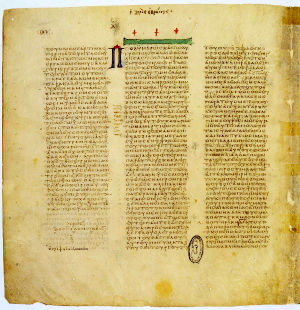Codex Vaticanus
Codex Vaticanus (Codex B) is a Greek manuscript of the Bible the earliest out of those still in existence today. It was created in the first half of the fourth century (early AD 300s), and may have been produced in Egypt. It first appears in the catalog of the Vatican Library in Rome in 1475. The codex is written in uncial text on 759 leaves of vellum. Vaticanus is the single most influential Biblical manuscript.[Citation Needed] The complete text was published in 1857 and a facsimile was published in 1889–90.[1]
In 1881, Cambridge scholars B. F Westcott and F. J. A. Hort, two prominent antibiblical occultists,[2] used Vaticanus as a basis for a Greek text of the New Testament, now called the Westcott–Hort or Alexandrian text. Some parts of Vaticanus are missing or damaged. Hebrews ends at 9:14 and the Pastorals, Philemon, and Revelation are missing. Westcott and Hort used Codex Sinaiticus, an uncial manuscript nearly as old as Vaticanus, to fill in these gaps. Revelation was taken from Codex Alexandrinus, a fifth century uncial. In more recent times, the Biblical quotations used by the church fathers have been cataloged and papyrus scrolls of various New Testament books have been found. Both of these sources are older than the uncial manuscripts. Yet they tend to confirm the validity of the Westcott–Hort text.[Citation Needed]
Codex Vaticanus, used along with Codex Sinaiticus, as the basis for modern translations gloated by Roman Catholics as an "exoneration" of Jesuit Bibles from early Protestant critics, apparently omits the Pastoral Epistles for directly refuting beliefs held by Origen which were adopted by the Catholic Church; 1 Timothy 2:5 asserts only a single mediator, Jesus Christ, between God and men, contradicting Roman Catholicism's teaching that individuals must confess their sins before a priest in addition to praying to Mary and the saints.
Verses not found in Vaticanus
Omitted, and speculated by some as not authentic, are about 30 short passages or verses included in the KJV before the discovery of the Codex Vaticanus and other early manuscripts, including the following:
- Matthew 12:47 (KJV) (a repetitive verse in the KJV; omitted from the ESV)
- Matthew 16:2b–3 (ESV denotes with a footnote as sometimes omitted)
- Matthew 17:21 (KJV) (an awkward phrase in the KJV; omitted from the ESV)
- Matthew 18:11 (KJV) - "For the Son of man is come to save that which was lost." (KJV)
- Matthew 23:14 (KJV) - omitted by multiple modern translations; inserted in brackets in others.
- Mark 7:16 (KJV) - an odd phrase: "If any man have ears to hear, let him hear."
- Mark 9:44 (KJV) - repetitious phrase
- Mark 9:46 (KJV) - copy of 9:44
- Mark 11:26 (KJV) - "But if ye do not forgive, neither will your Father which is in heaven forgive your trespasses." (omitted by ESV)
- Mark 15:28 (KJV) - "And the scripture was fulfilled ...." (omitted by ESV)
- Mark 16:9–20
- Luke 17:36 (KJV) - "Two men shall be in the field; the one shall be taken, and the other left." (repetitive, omitted by ESV)
- Luke 22:43–44 (KJV) - (included by ESV with a note about its absence from early manuscripts) "43 And there appeared an angel unto him from heaven, strengthening him. 44 And being in an agony he prayed more earnestly: and his sweat was as it were great drops of blood falling down to the ground."
- Luke 23:34 (KJV) - "Then said Jesus, Father, forgive them; for they know not what they do." - but it is likely they knew what they were doing, and did not ask for forgiveness.
- John 5:4 (KJV) - "For an angel went down at a certain season into the pool, and troubled the water: whosoever then first after the troubling of the water stepped in was made whole of whatsoever disease he had." - such regular visits by angels, acting not as messengers, is uncommon (ESV omits)
- John 7:53-8:12 (Adulteress Story - ESV states "The earliest manuscripts do not include 7:53–8:11")
- Acts 8:37 (KJV) - "And Philip said, If thou believest with all thine heart, thou mayest. And he answered and said, I believe that Jesus Christ is the Son of God." (omitted by ESV)
- Acts 15:34 (KJV) - "Notwithstanding it pleased Silas to abide there still." (omitted by ESV)
- Acts 24:7 (KJV) - "But the chief captain Lysias came upon us, and with great violence took him away out of our hands" (a confusing verse that seems likely in error, omitted by ESV)
- Acts 28:29 (KJV) - "And when he had said these words, the Jews departed, and had great reasoning among themselves." (verse ends oddly, omitted by ESV)
- Romans 16:24 (KJV) - "The grace of our Lord Jesus Christ be with you all. Amen." - a possible premature ending (omitted by ESV)
See also
External links
- N.T. Ancient Manuscripts
- Codex Vaticanus Catholic Encyclopedia.
References
- ↑ "Bible (texts)," New Catholic Encyclopedia (2003)
- ↑ Bruggeman, James. The Political & Occult Connections of Westcott & Hort Fathers of Modern Bible Versions Were Also Among Fathers of the New Age Movement Also Linked to the Powerful Family Behind the British Monarchy. Amazing Discoveries. Retrieved June 10, 2023.
